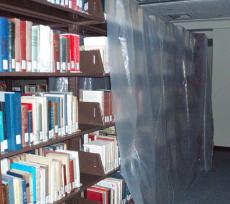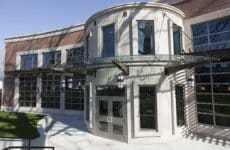By: Christina Kostic
Posted In: News

Photo credit: Christina Kostic
More than two weeks after a HVAC unit burst on the roof of the McKillop Library, intense clean-up efforts made by Salve facilities, housekeeping crews, library staff members, students and a professional disaster management company have helped to save over 200 books and to prevent further damage from mold.
The incident occurred on the night of February 11 when Rhode Island experienced a winter storm that included a brutal mixture of high winds, varying temperatures, snow and rain. The weather conditions caused the HVAC units on the roof of the west wing of the library to initially freeze, then thaw and eventually burst once the temperatures rose. This then caused the HVAC unit to leak significantly, resulting in a flood that affected all three floors of the library. However, most of the damage occurred on the third floor. The emergency plan was put into effect on 8 a.m. February 12, by Joan Bartram, Collection Development Librarian, whose responsibilities include Preservation Management Specialist for the library. Library staff members and students who normally work for Circulation, Technical Services and the University Computer Lab worked until 5:30 p.m. sorting through the damaged books. The entire west wing of the third floor was quarantined for the first five days after the flood. Subcontractors brought in dehumidifiers, refrigerants, fans and other machines to assure the stacks would dry out. During this time, students were not allowed to access the west wing. If they needed a book from the section, staff would retrieve it for them. Since then, imaging machines have been brought in to make sure that everything is completely dry. As of February 29, caution tape that previously had been surrounding the stacks has been taken down. Joe Foley, access services coordinator of the library, estimated that 1,400 books were destroyed in the flood. A large portion of the books that were damaged are education books, law books and political science books; this has obviously had detrimental effects on the students of those majors. “Bottom line is, it could have been a lot worse,” Foley said. “A good percentage of the books that were destroyed were from before 1980, which is considered old. Of course we don’t want any books destroyed, but it’s better that it was the older books rather than the new ones.” Foley is optimistic that insurance money will aid the school in purchasing new education, law and political science books to bulk the collections back up. Of the books that could be saved, they are back on the shelves. “We are currently pressing 200 books now to flatten out the pages to salvage them,” Foley said. The official numbers of books that were lost will not be calculated for several months.













